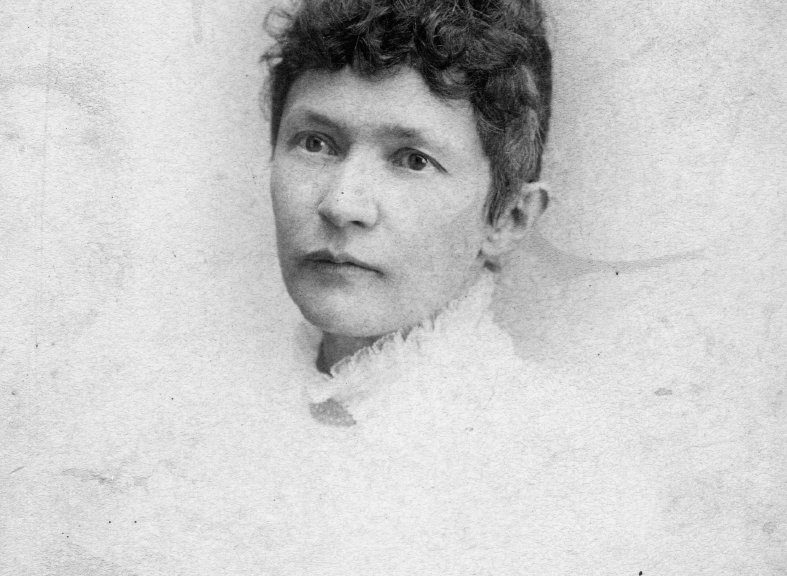by Mary K. Buck (1849-1901), poet of renown from Traverse City
Mary K. Buck, whose poetry we’ve featured before, comes again to grace our pages with her thoughtful pen. Buck was a strong advocate for women and letters, and we think she would be pleased to be remembered in conjunction with Women’s Equality Day. A day often forgotten in women’s history, Women’s Equality Day is celebrated on August 26th, when we remember the passing of the 19th Amendment to the United States Constitution, guaranteeing women the right to vote.

Buck did not live to see the Woman’s Suffrage movement achieve its penultimate goal, but in her lifetime, she touched the lives of many Traverse City women looking to learn and achieve. She was one of the founders of the Ladies’ Library Association, she supported the authorship of many of her friends by editing their works, and she co-authored two books in her lifetime with journalist M.E.C. Bates.
This poem, The Ideal Woman, comes from her book, Songs of the Northland, published posthumously by her husband in 1902. What does this poem say about how women viewed each other at the turn of the last century? Clearly, the Suffragette and socialist cry of “sisterhood” extended even to remote Traverse City. It makes one wonder: What did those ladies talk about at the Ladies’ Library Association meetings?
The Ideal Woman
Who shall describe her, since each mind doth hold
Its own conception of that fair ideal
To which our longing tend? Or who shall say
Which type were best of those we most admire?
Each one, perhaps, shrines in her inmost heart
The image of some loved one who to her
Holds highest place on earth, yet it may be
To eyes more critical devoid of grace.
(It needs a loving knowledge to discern
The inner beauty ‘neath a surface plain.)
Yet though your thought and mine may differ wide,
Some points there are on which we shall agree-
Some attributes all true hearts must admire;
Then bear with me while I shall seek to show
The vision sweet that stands as my ideal:
A woman strong in body, fair of form,
And radiant with the vigor health bestows;
Her face is beautiful with that rare charm-
The loveliness that shines from starry souls;
A mind of broad and varied culture, keen
Of intellect and quick of sympathy;
But best of all a heart o’erfilled with love,
And charity embracing God’s wide world.
Slow in her censure, ready with her praise.
Seeing the good, yet steadfast ‘gainst all wrong.
Demanding justice for another’s rights,
But modest in her claims for self alone.
Her dress? That which doth best become her and
Her circumstances; so, seeing her, we say,
“How well she looks,” and not “How fine her dress.”
Sweet piety is hers and doth pervade
Unconsciously each act. A trust in God
And faith in holy things befit her well.
For as a lovely flower without perfume
May please the eye but disappoints the heart,
So woman without piety must lack
The crowning grace.
“Old-fashioned,” do you say?
Ah, it may be, for women there have been
In every age so gracious, pure and good
That loyal hearts do homage to them still;
And on Time’s roll of honor they shall stand
For ages yet to come. “Old-Fashioned” these!
Though high or lowly be her lot, she rules,
A queen in her own realm, or court, or cot.
When public duties call she shuns them not,
But best fulfills her mission in her home-
A wise and tender mother, loving wife-
“Her husband’s heart doth safely trust in her,”
So Solomon described her, long ago.
A faithful friend who will no trust betray-
Her friendship is a boon one well may crave.
Not perfect quite- some sweet faults still remain
To link her with our common human needs,-
But gentle, gracious, lovable and true.
O, brave “New Woman,” standing calm, serene,
To watch the dawn of the new century,
Wilt thou fulfill for us the grand Ideal?
The power is in they hands to choose and mold
They destiny at will. What shall it be?
The heritage of countless years is thine-
The toil and travail of thy sisterhood.
That which they sought with tears, almost with blood,
Is freely thine if thou wilt take and use-
The open door to Learning, Science, Art;
The right to think, to labor, to achieve!
Use then thy power with humble, rev’rent heart,
And give the world its noblest womanhood.

From Michigan in Literature, Andrews, Clarence, 1992:
An unusual entry is Mary K. Buck’s Songs of the Northland (1902), published posthumously. Mrs. Buck (1849-1901) was born Marjanka Knizek in Bohemia and came to Traverse City, Michigan, at the end of the Civil War. She attended college, became a schoolteacher and a contributor to several nationally circulated magazines. She also collaborated with Mrs. M. E. C. Bates on a volume of northern Michigan stories, Along Traverse Shores.

